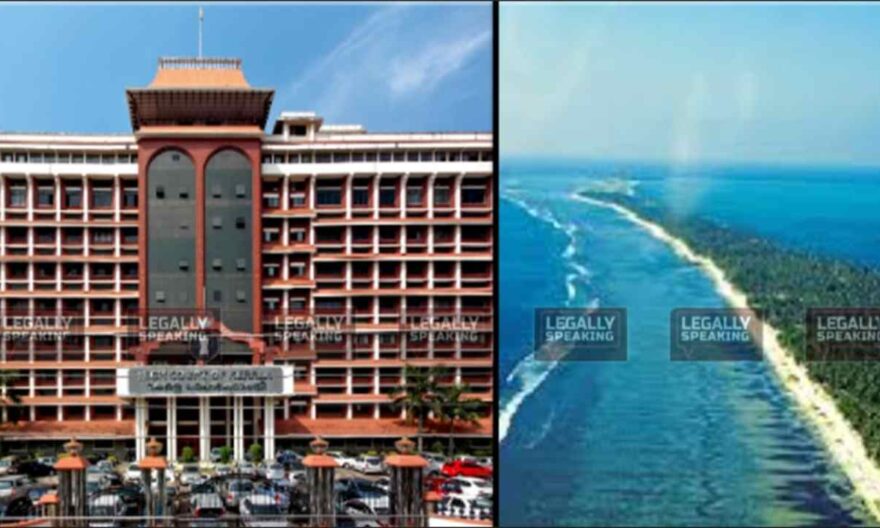
The Kerala High Court recently ruled that the High Court of Kerala possesses the authority, as per Article 235 of the Constitution, to exercise control over the district court and subordinate courts in Lakshadweep, including the power to conduct disciplinary proceedings against the presiding officers of these courts.
A single-judge Justice P V Kunhikrishnan held,
“In the light of Article 235 of the Constitution of India, it is declared that the control over the district court and courts subordinate thereto mentioned in Article 235 of the Constitution of India includes the power of disciplinary proceedings against the presiding officers of district court and courts subordinate thereto. Since the district court and subordinate courts in Lakshadweep are under the supervision of the High Court of Kerala, it is declared that the High Court of Kerala has got the power to initiate disciplinary proceedings against the presiding officers of the district court and courts subordinate thereto in the Lakshadweep Islands. I also clarify that the 1st respondent is free to frame Rules in tune with Article 235 of the Constitution of India, if necessary.”
The bench was hearing a review petition submitted by K. Cheriya Koya, the Sub Judge/Chief Judicial Magistrate of Amini, Lakshadweep, who is currently under suspension following the Court’s directive to the Lakshadweep Administrator to conduct a thorough inquiry into Koya’s actions. Koya filed the review petition, arguing that only the High Court has the authority to exercise disciplinary power over a judicial officer, and therefore the Administrator lacks the jurisdiction to take action against him.
The Review Petitioner contended that granting disciplinary powers to the Administrator, an executive authority, over a judicial officer would infringe upon the principles of separation of powers and judicial independence.
In response, the Administrator of Lakshwadeep argued that under Clause 5(ii) of the Constitution of Civil Codes in the Laccadive, Minicoy and Amindivi Islands (Civil Codes) Regulations 1965, the Administrator, in consultation with the High Court, has the authority to establish rules regarding the appointment of Subordinate Judges and Munsiffs. The counsel representing the High Court asserted that the High Court maintains control over the judicial officers of Lakshadweep.
The Court acknowledged that the issue regarding the Administrator’s role as the disciplinary authority for judicial officers in Lakshadweep had not been addressed in its previous judgment. However, the Court emphasized that Article 235 of the Constitution grants control over District Courts and subordinate courts, including matters such as appointments, promotions, and granting of leave to judicial service personnel, to the High Court.
In reaching its conclusion, the Court relied on various judgments of the Supreme Court, which established that the term “control” in Article 235 encompasses the power to initiate disciplinary proceedings against the presiding officers of District Courts and subordinate courts. The Court also referred to Supreme Court decisions that affirmed the High Court of Kerala’s authority in exercising control over the District Courts and subordinate courts in Lakshadweep.
“If there is any rule framed in violation of Article 235 of the Constitution, the same need not be looked into, because Article 235 of the Constitution prevails over all other rules. The Union territory of Lakshadweep is free to make appropriate rules, if necessary, in tune with Article 235 of the Constitution of India,” the bench observed.
In response to the arguments presented by the review petitioner, the Court proceeded to review and modify a specific part of its previous judgment. The Court revised its earlier directive to the Administrator of Lakshadweep and instead instructed the High Court of Kerala to take appropriate action against the review petitioner. The Court clarified that the review petitioner would remain under suspension until further orders are issued by the High Court.
The review petitioner further contended that when a portion of a judgment is under review, the entire judgment should be recalled, and it is the court’s responsibility to issue a fresh judgment or order. However, the Court did not concur with this argument put forth by the petitioner.
“The provisions of the Civil Procedure Code is not as such applicable while deciding a review petition filed in a writ petition under Article 226 and 227 of the Constitution of India. That can only be a guiding principle. The jurisdiction of this court under Article 226 and 227 of the Constitution of India, to review a judgment is wide and not controlled by the provisions of the Civil Procedure Code,” the bench noted.




